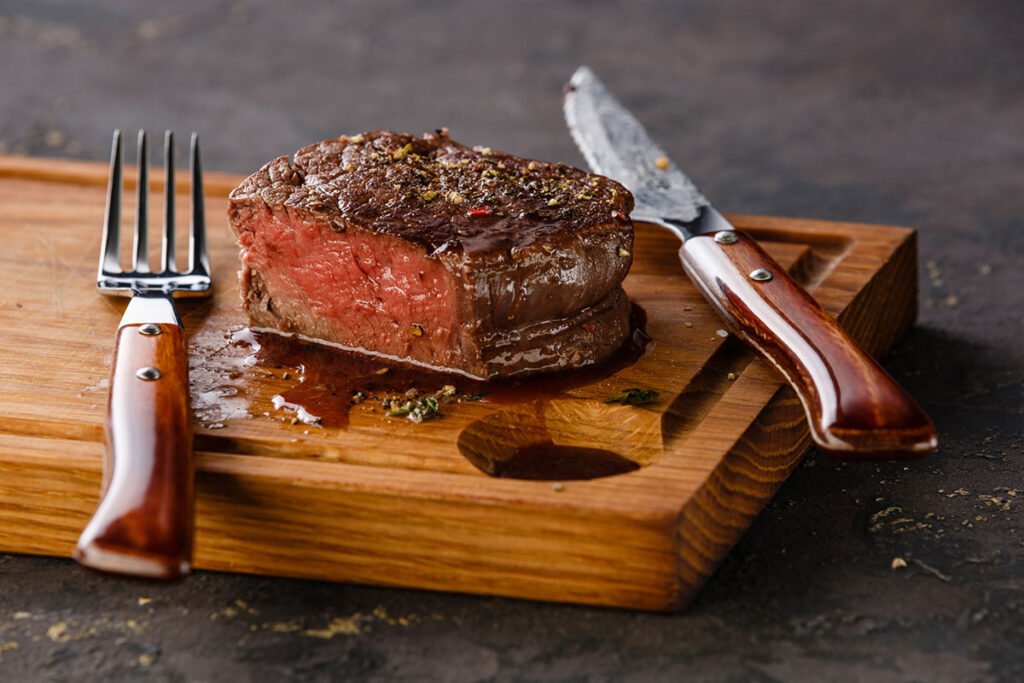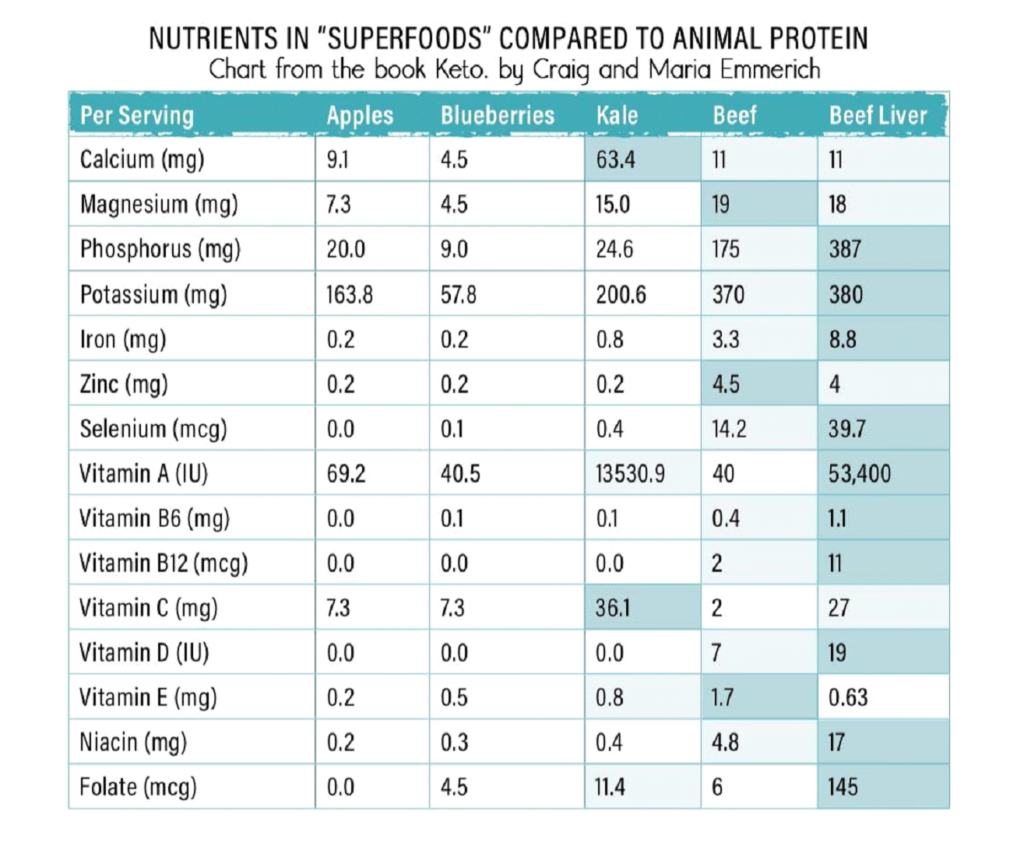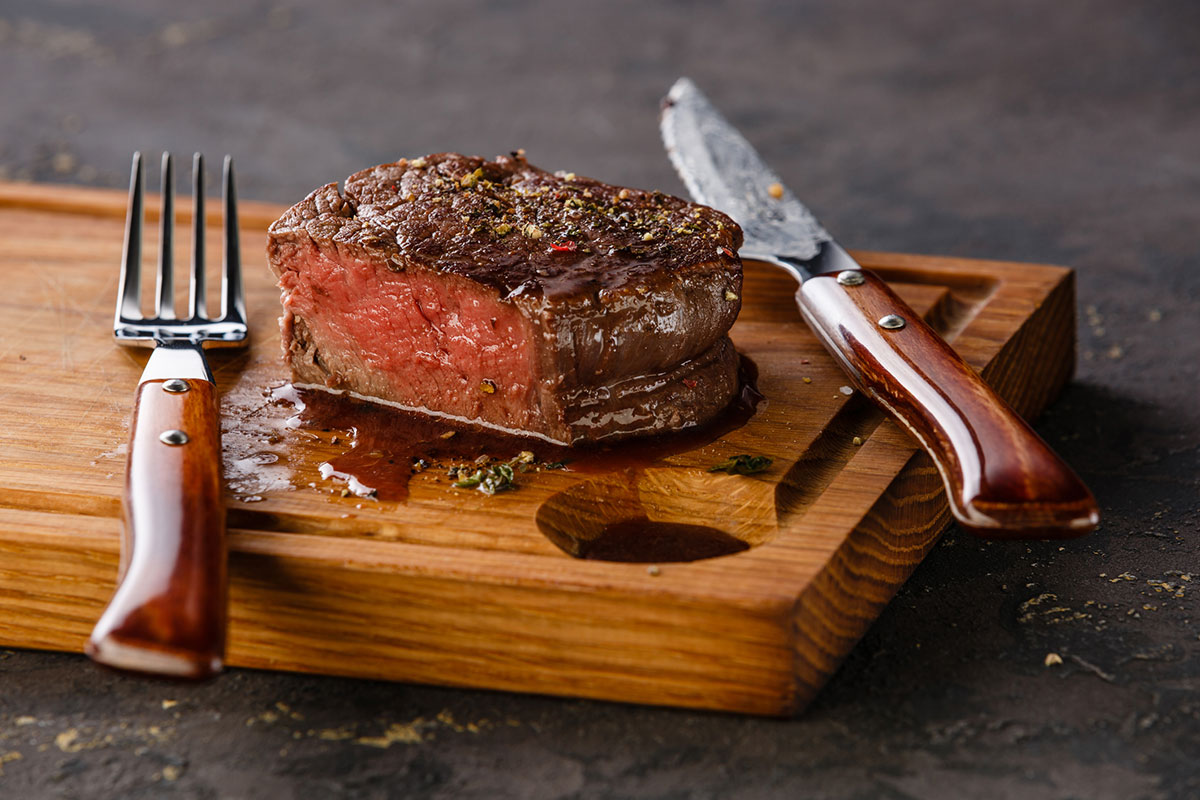Why I Prioritize Animal Protein and How It’s Saved My Health
For the last several years, there’s been more and more heavy pressure placed on people to shift to a plant-based diet to improve their health and save the planet. Eat less meat and focus on plant-based protein; plants provide more nutrients and are true “superfoods.”
The nutritional landscape can be very tricky to navigate, especially now. It feels like every time to take a step, there’s another new and confusing media article released.
- Don’t eat saturated fat; it’ll kill you
- Saturated fat is ok, go ahead and eat butter and eggs
- Saturated fat is terrible again; eat plants to get healthy and save the environment
With all this contradicting information out there, it’s no wonder people get confused and go down the wrong path. Or worse than that, they give up.
I’ve been there and have gone down multiple wrong paths and have also just thrown my hands up in frustration and gave up. Even when I started my health journey almost seven years ago now, I made so many wrong turns that I ended up really messing up my health, having to course-correct, and start down a new path to wellness.
The critical difference was this time, unlike previous times I had tried to get “healthy,” I had a new motivation, one that was rooted in who I was in God. It was that new motivation that has kept me from giving up and getting me to the healthiest point I’ve been in my adult life.

Psalm 139:14 states, “I praise you, for I am fearfully and wonderfully made. Wonderful are your works; my soul knows it very well.”
Knowing who I am in God, that I am a fearfully and wonderfully made a child of God, changed a lot of things in my life, especially how I viewed myself and the world around me. I became much more open and curious about points of view and information that I had previously dismissed outright.
Letting God into my heart was the single most life-changing decision I’ve ever made. He saved me, gave me the humility to accept that I had a lot to learn, and the passion and drive to seek out that new information so that I could start to heal, get well, and do the work He had charged me with completing.
Taking time to learn about the true impact of food was critical to helping me heal while appropriately nourishing my body.
Learning new concepts and viewpoints around food and nutritional lifestyles was not something that I had devoted a lot of time to unfortunately. I did what I imagine most Americans did when it came to nutritional knowledge, just listened to what my doctors, the popular media, and the government told me.
In a way, I had just stopped thinking for myself when it came to nutrition and wellness. I figured that since I wasn’t an “expert,” I wasn’t qualified to make those kinds of decisions about food and its impact on my health. When I finally let God back into my heart, when I accepted that I was truly loved and worthwhile in God’s eyes, is when I realized that I was just as capable as anyone else in determining what foods were actually good for my health. More than that, it was my responsibility to learn what would heal me so that I could do the work God had created for me.
God uniquely designed ruminant animals to eat grass and other vegetation and convert that plant mass into muscle and organs that humans were uniquely designed to eat and thrive on
God’s creation and design are beautifully intricate and astoundingly intelligent. Ruminants, like cows, deer, bison, and sheep, can eat plants and convert that plant mass into vitamins and nutrients that we, as humans, can absorb and use in our bodies.
Our systems are uniquely designed, from our teeth to our digestive systems to our organs and cells, to efficiently process animal protein. Every tooth that we have has a cutting edge on it. Our stomach pH is so acidic that it’s on par with scavengers like vultures and hyenas. Our small intestine is 2.5 times longer than any other member of the primate family and is designed to effectively process animal protein. We have an extremely short, large intestine and a tiny cecum and are not designed to process and ferment raw plant material effectively. That’s why, if you’ve ever eaten something like corn, you know you’ve eaten corn because that goes right through your body. It’s also why, if you’ve eaten a rib-eye steak, you can’t look in the toilet and think to yourself, “man, that looks like I ate a lot of steaks.”
God created and designed everything in an elegant, useful way, including plants.
Plants really don’t want to be eaten. The only thing a plant wants to be consumed is its fruit so that its seeds can propagate and grow new plants. It’s the only part of the plant that can be consumed that won’t harm the plant in any way. If you eat a plant’s stalk, leaves, or roots, the plant will die, and the plant does not want that to happen. Since plants can’t move or defend themselves physically, God gave them their own methods of protection, specifically plant toxins.
All plants are a little bit toxic to humans in some way, shape, or form. If a human is metabolically healthy, processing those plant toxins out of the body happens quickly and easily. However, if you’re metabolically compromised like I was and many Americans currently are, those plant toxins can really impact you in a negative way.
Plants are full of anti-nutrients.
- Nuts, spinach, and dark leafy greens are high in oxalates
- Nightshades, like tomatoes, potatoes, and eggplant, are high in toxins like glycoalkaloids
- Grains and legumes are high in phytic acid
These toxins are known as anti-nutrients, and they impact the human body’s ability to break down and absorb the nutrients that are present in the fruits and vegetables that we eat.
Oxalates are tiny little crystals that are present in plants such as spinach and almonds. They bind to minerals, such as calcium, iron, and magnesium and form crystal-like structures that our bodies can’t absorb or get rid of easily. Kidney stones are an example of calcium oxalate crystals that form in the body. So, all that iron and calcium that we are told is present in those nuts, and dark leafy greens aren’t accessible to the body because they get bound up by these oxalates.
Phytic acid is similar to oxalates in that they prevent the body from absorbing minerals in food, such as zinc and iron. In fact, both phytates and oxalates leach these minerals from the body, making your body more deficient in critical vitamins and minerals.
Beef, the real superfood…
Whenever I hear about superfoods, I can honestly say with 100% certainty that beef and animal organ meat was never mentioned to me. It was always something from the plant world.
Whether it was spinach, kale, blueberries, apples, or oatmeal, those were the foods that were mentioned constantly in the media and by medical professionals. It was always, eat more of these plant “superfoods” and less animal protein because these superfoods were chock full of the vitamins and minerals that you need to be healthy.
Below is a chart provided in the book Keto by Craig and Maria Emmerich. What’s truly fascinating is how beef and beef liver are the true nutrient powerhouses in comparison to what is defined as “superfoods” by conventional wisdom.

You aren’t what you eat; you’re what you absorb
.At the end of the day, what matters the most from a health perspective is the minerals and vitamins that your body can absorb. This is what’s known as nutrient bioavailability, and animal protein trumps any and all plant foods when it comes to nutrient bioavailability.
I recently read an article that stated that broccoli has more protein than steak. It stated that gram for gram broccoli was more protein-packed than steak. Not only is that statement misleading but it was so blatantly false that the story had to be corrected.
In 100g of broccoli, there are 2.8g of incomplete protein and 34 calories. In the equivalent amount of steak, there are 271 calories and 24.9g of complete protein. To get 24g of protein from broccoli would require an individual to consume 889g of broccoli which is an outlandish amount of broccoli. Add to that fact that the protein found in broccoli is not a complete protein, which means that it does not have all the amino acids in the right proportions for the human body. All that to say that it’s far easier to get the protein, minerals, and vitamins that a human body needs and can properly absorb from eating red meat and animal organs.
Our bodies need vitamins like K2, which come from animal sources. Vitamin K, found in plants, is a precursor to K2 and is not easily converted into K2 in the body. The vitamin A that we get from eating carrots and other vegetables is a vitamin A precursor that must be converted in the body after it’s consumed into retinol which is what humans use in the body. Retinol is found in animal protein as retinol and is easily used and doesn’t need to be converted.
Animal protein provides the nutrients that we need as humans in the readily bioavailable forms that we need to thrive. The vitamins and minerals in plants are in the form that cows and other ruminants need to thrive, not humans.
Genesis 4:3-5 states, “In the course of time, Cain brought the Lord an offering of the fruit of the ground, and Abel also brought of the firstborn of his flock and of their fat portions. And the Lord had regard for Abel and his offering, but for Cain and his offering he had no regard.”
I’ve read this verse more times than I can count, and it wasn’t until just this past year that it occurred to me that the offering that pleased God was the one that contained animal protein and fat, offered reverentially to Him.
God created plants, ruminant animals, and humans to depend on each other to not just survive but to thrive. Through God’s grace, I was able to figure out the foods that truly healed and nourished my body, and those foods were animal foods. No two people are alike; different foods affect each person a little differently. However, animal protein is the most nutrient-dense, bioavailable food that exists for humans, and the best way to heal and nourish the body is through the animal foods God created all humans to consume and thrive on.
You may also like to read, How I Stopped Fearing Fat and Embraced it for My Health.

If you want to eat better, get stronger, and lose weight, then let’s talk. Request a call with me now.

